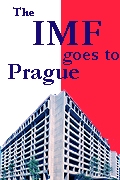(On the occasion of the current IMF and World Bank summit in Prague and the accompanying protests, the Brazilian paper Folha de São Paolo asked Jan Čulík a few questions regarding the current situation in the Czech Republic. This is an extended version of an interview which was published by Folha de São Paolo on 18 September 2000.)
Folha de São Paolo: Do you see any ideological similarity between the civil groups that have arisen in the Czech Republic since 1998 and the groups that form the anti-globalization rainbow coalition?
Jan Čulík: As far as I can tell, the Czech anti-globalisation activists have a similar ideological and philosophical background as the members of the international anti-globalisation movement. The Czech anti-globalisation activists follow international developments in the anti-globalisation movement very closely, although their protest actions in the Czech Republic have been generally very moderate. The Czech anti-globalisation activists, of course, have their own reasons why they are supporting anti-globalisation protests.
Unlike, say, people in the United States, Great Britain or France, people in the Czech Republic feel quite acutely that they are or soon could become just passive "victims" of international capitalism. Czechs feel they cannot easily be masters of their own fate. People in the Czech Republic are generally poorer than people in the West. It is much easier for an American in the US than for a Czech in the Czech Republic to get capital investment and start an international company, for instance on the Internet, and to "walk proud" as an independent, wealthy individual who makes important decisions.
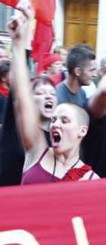 I think Czechs feel much more often than, say, the Americans, that they are disenfranchised. At least that section of the Czech society that thinks about these issues does feel that the Czechs are passive victims of international capital. On the whole, Czech society is now quite suspicious of the West. It does not know what to expect from the West, it no longer harbours any illusions about the West wishing to "help" the East.
I think Czechs feel much more often than, say, the Americans, that they are disenfranchised. At least that section of the Czech society that thinks about these issues does feel that the Czechs are passive victims of international capital. On the whole, Czech society is now quite suspicious of the West. It does not know what to expect from the West, it no longer harbours any illusions about the West wishing to "help" the East.
While Czech society wants to be part of the West, it is not clear how soon that will occur. At the moment, the Czech anti-globalisation activists (INPEG, the Initiation Against Economic Globalisation) are very bitter that, as they see it, the international establishment "powers that be" debate topical problems only with such people as they see fit.
Czech immigration is being obstructive: on Sunday morning, 24 September, for instance, a train with the supporters of the Italian organisation YA BASTA was held on the Czech-Austrian border. INPEG argues that the authorities are "preventing meaningful democratic discussion." In spite of the fact that the Czech media have been systematically warning against the "foreign hordes" who will disrupt law and order, so far (until Sunday 24 September, midday) the Prague demonstrations have been peaceful, as you can see from the selection of photographs that CER carries in this issue.
Czech society on the whole is rather conservative and ecological activism is generally frowned upon. (That is also why local environmental protests are rather meek.) While most Czechs now probably feel a certain amount of distrust towards the West and the international economic institutions, the majority of the Czech society will not support the anti-globalisation protests, especially as there has been concerted government propaganda in the media about all the "criminals and anarchists" who are due to descend on Prague.
The IMF and the World Bank have complained that the Czech media had not properly explained to the Czech public what these institutions are about: instead the Czech media have been obsessed for many weeks now with the "threat from the international extremists and thugs."  Czech Prime Minister Zeman has said that his government will respect the right to peaceful protest, but it will act firmly against violence.
Czech Prime Minister Zeman has said that his government will respect the right to peaceful protest, but it will act firmly against violence.
Ecological activists are often seen as irresponsible extremists in the Czech Republic today. People are complaining that, for instance, in the ongoing debate about whether or not to bring online a new nuclear power station (Temelín), impartial, objective arguments are rarely heard; what is heard is biased propaganda from the opposing sides: the nuclear lobby on the one hand and the ecological activists on the other.
Folha de São Paolo: What element, economics or politics, is the main source of the current climate of disenchantment in Prague? Would not the sins of the political class be forgiven were it not for the bad effects of the Asian crisis?
Jan Čulík:The main source of disenchantment in Czech society now is much more local. After the fall of Communism in 1989, the country was ruled by a prime minister (Václav Klaus) and a right-of-centre party (Civic Democrats) who pretended to be supporters of the free market. Klaus told the population, which expected a wise monarch to solve all their problems quickly that privatisation of the state industries (everything had been 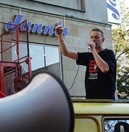 state-owned under Communism) would immediately solve the country's problems and everyone would become prosperous.
state-owned under Communism) would immediately solve the country's problems and everyone would become prosperous.
In fact, the whole thing has been much more complex, Klaus has proved to be much more bound to his statist, Marxist past than one would have expected, and he mostly had very little experience with the practicalities of running a modern free-market economy, the regulation of the stock exchange, etc. Thus, Klaus's privatisation proved an absolute shambles: there was insuficient regulation and most of the state-owned property was stolen by unscrupulous individuals. Take the collapse of numerous banks, the loss of people's savings and you have a recipe for deep disenchantment.
In the 1998 pre-election campaign, the opposition Social Democrats claimed that they would be able to sort out all the mess, made by Klaus's Civic Democrats. But although they won the election, they had a very slender majority and could not form a government. So, they have formed an informal coalition with their political arch-enemies, the very Civic Democrats whom they had been painting as the devil incarnate before the elections! This coalition is still in force—it is called an "opposition agreement." In effect, it means that the Social Democrats rule the Czech Republic now with a tacit agreement of Klaus's party.
You can imagine that this has led to an enormous amount of disenchantment amongst the population. You vote for one or the other of the two main opposing parties, in the election campaign they attack one another ferociously, and immediately after the election, they join hands. Some commentators have argued that the "opposition agreement" is good for the stability of the country, and it is true that the ruling Social Democrats have had some success in reviving the flagging economy.
But the opposition agreement has alienated many of the voters. They no longer feel that the Czech state belongs to them. The state has been sort of misappropriated by a handful of unscrupulous politicians, professional manipulators who are only interested in their own personal well-being. That is the prevailing popular mood in the Czech Republic now.
In a way, it can even be argued that the political situation has become as 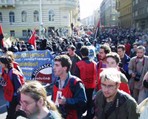 stagnant as it was in the depressing 1970s—in the aftermath of the 1968 Soviet invasion to Czechoslovakia, when the country had been turned into a colony of Russia and was governed by faceless pro-Soviet stooges.
stagnant as it was in the depressing 1970s—in the aftermath of the 1968 Soviet invasion to Czechoslovakia, when the country had been turned into a colony of Russia and was governed by faceless pro-Soviet stooges.
Of course, there is no political oppression now, but there is little lively and stimulating debate in the media, for instance. Everything moves in rather conventional vicious circles. There are no fresh ideas. It is frowned upon to come up with "subversive" thoughts. Hence people's disillusionment. But some people have remarked that disillusionment in the Czech Republic predates the creation of the opposition agreement: Czech "elites" have the tendency to rule on their own.
It could be argued that the Czech Republic has been a victim of conventional, "closed" thinking (especially in the media) virtually since the fall of Communism. One is supposed to follow the "received" view, which usually consists of anodyne banality. In this context, it is perhaps quite interesting that the Czech Ústav pro jazyk český, The Institute for the Study of the Czech Language, has attempted to analyse linguistically political debates, as they are broadcast by Czech TV and Czech Radio. The Institute failed in this: the linguistic analysis showed that the recordings of the debates consist of stereotyped stock linguistic blocks which cannot be regarded as normal, living language.
Folha de São Paolo: How do you see the gains of the unreformed Communist Party in opinion polls?
Jan Čulík: Since the Social Democrats have been capable of reviving the economy a little, the support of the unreformed Communist party has gone down again in recent months. Whatever level it is at now, I do not think that Czech people support the unreformed Communists because they want a return to a totalitarian Communist regime. This is a protest vote. If you live in a region with high unemployment, if you see that the media and the main establishment parties are ignoring the problem, you are going to support the party which is "outside" Czech etablishment politics.
Although the Czech Communist Party is certainly controversial (it has not condemned its totalitarian past, and its political programme is contradictory and impractical), the Communists have one great advantage. The "establishment" parties have kept the Communist Party "out of politics"—although the Communists have deputies in Parliament, these are generally ignored, and the main parties do not cooperate with them; Communist politicians rarely appear in television debates, President Václav Havel refuses to meet representatives of the Communist Party, although the Communist deputies have been elected by a sizable part of the Czech population.
Since the Communists have not participated in government over the past ten years, their hands are now clean—they have not participated in any of the political scandals that have plagued the Czech Republic over the past few years. Thus, some people are willing to support the Communists politically, although their programme is muddled, emotional and out of date. This is, mind you, also because Czech communists have been kept out of Czech politics. Had they been given some political responsibility, their political programme would have become much more pragmatic.
Incidentally, I do not think that it matters very much which party actually now rules in the Czech Republic. Whoever might be in government, they must follow orders from Brussels anyway—if there is to be an economic future for the Czech Republic. That is the pressure of globalisation.
Folha de São Paolo: A recent article in the newspaper The Guardian said that Czechs looks to the European Union as their chance of having a "society ruled by law." Would you agree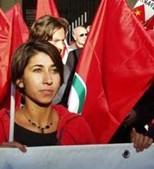 with that? How is the theme of European integration viewed in Prague?
with that? How is the theme of European integration viewed in Prague?
Jan Čulík: There are Eurosceptic trends especially in Václav Klaus's Civic Democratic Party, and the issue is complex. Klaus's party is Eurosceptic because it sensitively feels the rise of Czech nationalism and responds to it. Many Czechs are certainly very frustrated over the fact how relatively weak and inefficient is the Czech judiciary and the Czech civil service. There is a lot of inefficient bureaucracy, a lot of bribery and corruption, and certainly, there is much yearning for the rule of law. I am not sure, though, that many Czechs understand what membership of the European Union would mean for them.
For the moment, the EU is making itself unpopular, for instance by forcing cheap agricultural produce on to the Czech markets, which is a serious blow to Czech farmers. In the past few days, the European Parliament issued a declaration against the new Czech nuclear power station, Temelín, due to be open soon. The Czech government as well as many Czechs tend to interpret this declaration and the German and the Austrian anti-nuclear protests as inteference in Czech internal affairs.
Also, the 1999 bombing of Kosovo and Serbia has made the Czechs seriously wary of the West—the Czechs have always been friendly with the Serbs, and most of them simply do not believe that the Western intervention in Yugoslavia was motivated by idealism. Although many Czechs would undoubtedly welcome an invitation to join the EU, others are rather fearful of what this might mean.
Jan Čulík, 25 September 2000
Photos of the Prague protests are all by Štěpán Kotrba and Luboš Wišniewski Jr. See our gallery for more.
Moving on:
- View photographs from the Prague anti-globalisation protests
- Archive of Jan Čulík's articles in CER
- Browse through the CER eBookstore for electronic books
- Buy English-language books on the Czech Republic through CER
- Return to CER front page



